One of the disadvantages of pet rabbits is that they are notorious chewers. You may be surprised at the variety of household items that rabbits like to sink their teeth in to. But some materials can be dangerous for rabbits to chew on.
Wires and cables are dangerous, as your rabbit may get electrocuted. Fabric and plastic can cause impactions in your rabbit’s gut. Certain woods, such as cherry and oak, are toxic. Keep these items out of your rabbit’s reach. Instead, offer your rabbit hay, or chew toys made from safe woods such as willow.
We’ll look at why rabbits like to chew, and why it’s crucial for their health. We’ll cover some of the items and materials that rabbits should never chew on. We’ll then share some tips and advice on how to stop your rabbit chewing everything, and what to give them instead.
Why Do Rabbits Like Chewing?
Most new rabbit owners are surprised to discover how much rabbits love to chew. Rabbits are herbivores (not meat eaters), but they will chew anything.
If left to their own devices, rabbits will nibble on practically everything within their reach. From drapes to baseboards, no part of the house is safe.
This poses a distinct problem, as certain materials are unsafe for rabbits to chew on. Some are toxic, and will upset your bunny’s stomach. Others aren’t poisonous, but can cause intestinal blockages if swallowed.
Not to mention, a rabbit chewing on everything can cause considerable damage to your home. A house covered in rabbit chew-marks looks unattractive – not ideal if you’re entertaining guests.
So, why do rabbits chew? The answer lies in their teeth. Rabbits’ teeth never stop growing. According to the Journal of Veterinary Dentistry, they grow at a rate of 2mm per week on average.
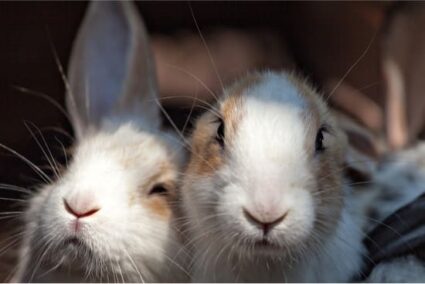
Because of this, rabbits need to chew almost constantly, to file their teeth down. If they don’t, their teeth will become too long. Overgrown teeth can cause health problems, such as pain and inability to eat.
Pet rabbits should be encouraged to chew as often as possible. However, you must ensure that your rabbit doesn’t chew on anything dangerous. Certain substances can pose health risks to rabbits.
Some bunnies are more prone to chewing than others. So, depending on your rabbit’s personality, you may have to work harder to rabbit-proof your home.
Can Rabbits Chew on Cardboard?
Few rabbits can resist the temptation of cardboard. It’s made from cellulose (plant fiber), the same substance that makes up the bulk of a rabbit’s diet.
When a rabbit gets started on cardboard, they can destroy a box in minutes flat. But is it bad for rabbits to chew on cardboard? The answer is slightly complicated.
Untreated, uncoated cardboard is not toxic to rabbits. But not all cardboard is the same. Certain types of cardboard can be dangerous when ingested. For example:
- Shiny cardboard. This has been coated in something, like wax or plastic. These coatings can be harmful to rabbits.
- Colored or printed cardboard. Color, text, or pictures printed on cardboard indicates the presence of ink. Ink can be toxic to rabbits, especially in large quantities.
- Cardboard with foil on one side. Some kinds of cardboard, such as juice cartons and takeout containers, have a metallic side. Rabbits should not eat foil or any metal.
As long as the cardboard has no coating or ink, it’s non-toxic and safe for rabbits to chew on.
However, even plain cardboard can be bad for rabbits’ digestion if they consume too much. Excessive amounts of cardboard can cause intestinal blockages.
So, can rabbits eat toilet paper rolls and other plain cardboard? Plain cardboard is safe, in small amounts. But can rabbits eat cereal boxes, or any other printed or coated cardboard? No, as any additives could be toxic.
Can Rabbits Chew Paper?
Following along the same lines as cardboard, let’s examine if it’s safe for rabbits to chew on paper.
Paper is made from indigestible wood pulp. The pulp is a mixture of cellulose (plant fiber), plant cell tissues called lignins, and water.
Rabbits are drawn to paper for the same reason rabbits chew cardboard: the cellulose is irresistible to them. Cellulose helps rabbits’ digestive systems to work smoothly. This is why a rabbit’s diet should mostly be made up of fibrous foods, such as hay.
There isn’t anything in paper which makes it toxic for rabbits to chew. Like plain cardboard, it’s non-toxic and won’t harm your rabbit if they ingest some.
However, that doesn’t necessarily mean that it’s a good idea to feed your rabbit paper. Paper, like cardboard, has low nutritional value. It can also cause blockages if consumed in excess.
Also, be wary of what sort of paper your rabbit can access. Blank paper is fine, but anything printed with ink or toner – like newspaper – could be dangerous. And always avoid shiny or colored paper, such as magazine paper.
You may also wonder: can rabbits chew paper towels? This isn’t a good idea, because paper towels are designed to be absorbent. They can expand inside a rabbit’s stomach, causing gas, pain, and blockages.
So, while paper is not necessarily toxic to rabbits, they shouldn’t chew on paper regularly. If your rabbit has a habit of eating paper, try to restrict their supply. Don’t use it as your rabbit’s bedding.
Can Rabbits Chew Wood?
You may have come across wooden chew toys for rabbits. Wood is sturdy, durable, and great for helping to file rabbits’ teeth down. And as a bonus, it’s all-natural.
However, there are certain types of wood that rabbits should never chew. Some trees are toxic to rabbits. For example:
- Stone fruit trees. If the wood comes from a tree that bears fruit with a stone, it’s poisonous to rabbits. Cherry, apricot, peach, and plum trees are all toxic.
- Cedar and pine. These woods contain phenols, chemicals that give these woods their distinct scent. Some people claim that heat-treated pine is safe, but it’s better to steer clear, just in case.
- Elder and oak. These woods contain cyanide. While it’s only a small amount, it may be enough to cause serious harm to a rabbit.
- Redwood, walnut and other woods containing tannins.
There are many more types of wood that may be harmful to rabbits. So, which woods are safe? Stick to the following species: willow, hazel, birch, spruce, maple, hawthorn, and fir. Here’s some further information on types of wood that are safe for rabbits.
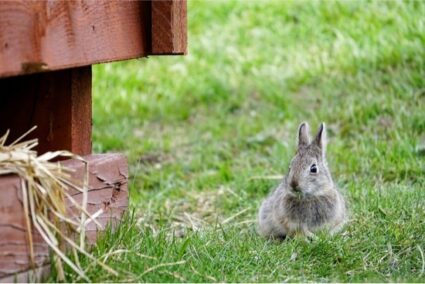
Apple, pear, raspberry, and blackberry branches are also safe. While these are fruits, they’re not stone fruits, so the wood isn’t poisonous.
If you’re collecting wild wood, thoroughly dry and sanitize it before offering it to your rabbit. Baking it in the oven can help to kill any bacteria.
When buying from a store, choose wooden toys that are labeled as safe for rabbits. Wooden furniture, wicker baskets, plywood, and fiber board should all be avoided. They may contain chemicals, varnish, glue, or a dye, which can all be toxic to rabbits.
Can Rabbits Chew Pine Cones?
Pine cones are the female reproductive organs of pine trees. They have a woody texture, and are made up of dozens of overlapping scales.
Most rabbits adore pine cones. They enjoy not only chewing them, but also tossing them up into the air, throwing them around and chasing them.
However, pine cones are not always safe for rabbits. Wild-collected pine cones can harbor bacteria, insects, and pesticides. They also contain sap, which rabbits shouldn’t ingest.
If you want to prepare wild pine cones for your rabbits, select them from a pesticide-free source. If you’re not sure, don’t take any chances as pesticides can be fatal to rabbits.
Then, sterilize the pine cones using the following method:
- Wash. Fill a large bowl or sink with warm water, and add a cup of white vinegar. Fully submerge the pine cones and stir them around. This will remove any dried sap, dirt, and foreign materials.
- Dry. Leave your pine cones somewhere sunny to dry completely. This should take around two to four days.
- Bake. Place the pine cones on a foil-lined baking sheet and bake at 250 degrees Fahrenheit for 2 hours. This will kill any germs and remaining insects, and dry up the sap. As a bonus, the scales will open up, making them easier for rabbits to chew.
- Cool. Remove the pine cones from the oven using tongs, and place them on a wire rack to cool completely.
If you are buying pine cones from a store, only purchase those which are labeled safe for small animals. Pine cones sold for decorative purposes may be varnished, or treated with harsh chemicals.
Can Rabbits Chew Rope?
Many rabbits, bird, and small animal toys are made from blocks or balls tied together with rope. The rope is only there to hold the toy together. But, occasionally, you may find your rabbit nibbling on it.
If your rabbit is a rope-chewer, you are probably wondering whether rope is safe for rabbits to eat. The answer all depends on what material the rope is made from. Some materials are safe for rabbits to eat, and others aren’t. The most common rope materials are:
- Cotton. Made from the fluffy fibers of the cotton plant, cotton twine is spun to be extremely strong. It does not disintegrate in the gut.
- Jute. This is made from plant fibers in the genus Corchorus. It disintegrates faster than cotton.
- Sisal. This is made out of the leaves of a plant in the Agave genus. Sisal is stiff and reasonably hard wearing. It’s commonly used for cat scratching posts.
- Synthetic materials. Twine and rope can also be made from man-made materials such as polypropylene.
Rope made from sisal and jute is safe for rabbits. These materials can be chewed into tiny pieces, which easily pass through the gut. Ensure that the rope you choose is 100% natural and hasn’t been treated with any chemicals.
Cotton and polypropylene ropes are unsafe for rabbits. These materials are often swallowed in long strings, which can form obstructions in the gut. Never let your rabbit chew on cotton or polypropylene twine.
Can Bunnies Chew Carpet?
Along with chewing, rabbits love to dig. Wild European rabbits, from which domestic rabbits are descended, dig large underground burrows called warrens. This instinct has not yet left our pet rabbits.
This is why owners of indoor rabbits sometimes find that their rabbit is obsessed with the carpet. They dig at it, scratch it and chew it, trying to dig a tunnel in the nonexistent soil. This behavior can be exacerbated by boredom, but it’s completely normal.
Many rabbits won’t like the taste of carpet. So, instead of swallowing it, they’ll chew it up and spit it out. If this is the case for your bunny, it won’t do them any harm, though your carpet may suffer.
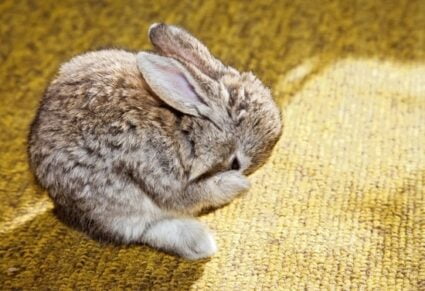
However, some rabbits will swallow pieces of the carpet when they chew it up. This is dangerous for two main reasons:
- Carpets are usually made of synthetic fibers and treated with chemicals which may be toxic.
- Carpet fibers won’t break down in a rabbit’s gut, and they’re difficult to pass. If your rabbit eats a lot of carpet, it may cause a gastrointestinal blockage.
Though it may be instinctual, rabbits should not be allowed to chew carpet. The same goes for towels, blankets and any other fabric.
If it’s practical to do so, move your rabbit into a non-carpeted part of the home. Use baby gates or a large X-pen to cordon off carpeted areas. Alternatively, place some large, heavy tiles over any carpet in your rabbit’s area.
Can Rabbits Chew Plastic?
Plastic is a man-made material which can be harmful when swallowed. It’s extremely resilient, and won’t break down when ingested, nor will it biodegrade over time. A plastic bottle may take a thousand years to decompose – no wonder a rabbit’s gut can’t digest it.
Rabbits usually opt to chew on natural materials, such as wood and cardboard, before attacking plastic. However, some rabbits can develop obsessive tendencies, and will nibble everything in sight. Boredom and lack of physical or mental stimulation can also trigger rabbits to chew plastic.
Common plastic items that rabbits might chew on include:
- Litter boxes
- Plastic fencing or caging
- Plastic-coated cables, cable protectors or tubing
- Video game and television controllers
- Artificial grass or flowers
Plastic poses a problem for two main reasons. If the piece of plastic ingested is sharp, it may cause intestinal perforation. If your rabbit consumes an excessive amount of plastic, or a large piece, it may cause an obstruction.
Not all rabbits chew on plastic. But if your rabbit shows interest, move any plastic items out of their reach, or cover them.
If you have discovered your rabbit chewing on plastic litter box or something else, don’t panic. Monitor your rabbit closely over the next few days, including their eating and toilet habits and general demeanor. If you’re concerned, take your rabbit to a veterinarian.
Can Rabbits Die From Chewing Wires?
One of the most dangerous items that rabbits can chew on is electrical cables. While they might not seem appetizing to you, most rabbits can’t resist the temptation. If you’ve ever let your rabbit loose in a room with exposed electrics, you’ll know this firsthand.
There’s something about electrical cords that tempt rabbits like nothing else. But why do rabbits chew cables, and how dangerous is it?
The reasoning behind this behavior can be explained by evolutionary instinct.
European rabbits, their ancestors, live in complex underground burrows. Occasionally, tree roots will grow into their burrows, obstructing their pathways. Rabbits learned to nibble these roots off as soon as they see them, to keep their warrens clear.
Our electrical cords and cables look suspiciously like tree roots to rabbits. So, when your pet rabbit sees a cable, it will instinctively begin to chew it.
The dangers associated with rabbits chewing electrical wires is straightforward. Interfering with an electric current can result in a shock, or electrocution. Not only this, but ingesting plastic and metal can cause damage to your rabbit’s digestive system.
Rabbits can die from chewing cables, so keep them strictly out of your rabbits’ reach. If you can’t keep your rabbit away from them, use hard plastic tubing to cover them.
Can Rabbits Chew on Metal?
Rabbits don’t instinctively like eating metal. It offers them no nutrition and is usually difficult to chew through. However, there are certain circumstances in which rabbits may chew on metal.
For example, house rabbits kept confined in cages often chew on the metal bars of their cage. There are two main reasons why your rabbit chews on cage bars:
- The bars are in your rabbit’s way. As far as your rabbit is concerned, the bars are blocking their access to the outside. Rabbits don’t understand that their cage is confining them on purpose. So, they chew the bars in an attempt to get out.
- Your rabbit is bored. Rabbits are prone to chewing obsessively when they’re under stimulated. If your rabbit doesn’t have anything better to do, they may chew cage bars out of sheer boredom.
The main risk that arises from chewing on metal bars is potential tooth damage. Hard metals could chip your rabbit’s teeth. Softer metals can also be dangerous, as small pieces could perforate your rabbits’ stomach, or cause a blockage.
The key to preventing rabbits chewing metal is to remove it from their reach. If this isn’t possible, give them plenty of other things to do. You can also cover up cage bars with a towel or blanket, but beware of your rabbit chewing this, instead.
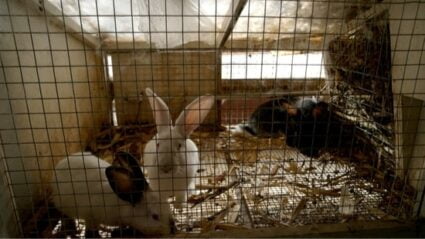
Can Rabbits Chew Walls?
We don’t often picture rabbits chewing on our house itself. But in reality, bored rabbits can and do chew on walls, baseboards, and molding, brickwork, and mortar. Pica in rabbits is unusual, but most certainly not unheard of.
As when chewing on metal, rabbits that nibble bricks and concrete can experience chipped or broken teeth. Along with this, some walls are constructed with chemicals that may be dangerous or toxic when ingested. You may find that the dust causes your rabbit to sneeze a lot.
The most foolproof way to stop rabbits chewing on walls is to restrict their access to them. Set up a large x-pen for your rabbit in the middle of a room, away from the walls.
You could also nail wooden planks to the base of the wall. Securely cover every part of the wall that your rabbit can reach.
In combination with the above techniques, consider applying a bitter-tasting spray or soap to parts of the wall. This won’t hurt your rabbit if ingested, but it will taste unpleasant, discouraging your rabbit from chewing.
Can Rabbits Eat Indoor Plants?
Rabbits are hard-wired to eat any plant that they come across. They don’t instinctively know which plants are poisonous, and which are safe. Wild rabbits rely on the older members of their warren to steer them away from dangerous plants.
House rabbits, unfortunately, don’t have any such guidance. So when confronted with a toxic plant, a rabbit’s instinct will be to eat it, rather than avoid it.
Many common houseplants and garden plants are poisonous to rabbits. Tulips, daffodils and any plants that are grown from a bulb are toxic, for example.
There is such a wide variety of houseplants that it’s impossible to research them all. For this reason, consider any houseplants to be dangerous for your rabbit. You should never let your rabbit chew on any houseplant, no matter how innocuous it may seem.
The safest way of getting around this problem is not to keep houseplants. If you do have indoor plants, keep them on high shelves where your rabbit can’t reach them. Alternatively, keep plants only in rooms which your rabbit can’t access.
How Do I Stop My Rabbit Chewing?
With their ever-growing teeth, and desire to graze constantly, a rabbit’s urge to chew is rarely satiated. You can’t stop them from chewing, but you must ensure that they don’t chew on anything dangerous.
Rabbits do not respond to negative reinforcement or punishment. It won’t do much good to yell at, hit, or reprimand your rabbit. Rabbits don’t associate punishments with “crimes”; instead, they learn to fear whoever is punishing them.
So, rather than punishment, use the following methods to discourage your rabbit from chewing.
- Remove dangerous objects from your rabbit’s reach. Keep anything you don’t want to be chewed out of reach, or in another room. You can use baby gates to barricade certain areas.
- Encourage exercise and play. Rabbits often chew out of boredom. Provide your rabbit with plenty of toys, attention, and exercise opportunities.
- Spaying and neutering. Obsessive chewing can be a side effect of an abundance of sex hormones. Getting your rabbit fixed can solve the problem completely.
- Positive reinforcement. When your rabbit chews on the right things, shower them with affection. If they chew on something they shouldn’t, move them away and divert their attention.
- Bitter apple spray. This has a strong, unpleasant taste. Spray this on furniture or carpets to discourage your rabbit from chewing there.
All rabbits have to chew from time to time, to keep their teeth filed down. So, always provide safe items for them to nibble on instead.
What Can I Give My Rabbit to Chew On?
A rabbit that’s determined to chew will find something to chew on, no matter what. So, your rabbit should always have an appropriate chew toy within their reach.
For best results, place chew toys near areas where your rabbit likes to chew. For example, a toy near your dining table can distract your rabbit from chewing on the table legs. If you divert your rabbit’s attention, your problem should quickly resolve itself.
There are many rabbit-safe materials to chew on. For example:
- Cardboard. Choose clean, uncolored, uncoated cardboard that is free from ink, glue, and other substances. Toilet roll tubes stuffed with hay make particularly exciting toys.
- Apple, aspen, or willow branches. The wood should be clean, dried, and untreated.
- Pine cones. They should be dried and sterilized.
- Sisal rope toys. Sisal is tough enough to withstand rigorous chewing and won’t harm your rabbit.
- Compressed hay blocks. These are harder to chew than loose hay, so will keep your rabbit occupied for hours.
You can make chew toys yourself, order them online, or buy them from your local pet store. Rabbits get bored with toys quickly, so rotate their chew toys regularly.
Always provide unlimited hay for your rabbit to eat, but make sure that the hay isn’t moldy. Rabbits love to chew on hay, and it should make up 85% of their diet. If your rabbit has round-the-clock access to hay, they’ll be less likely to chew on other things.

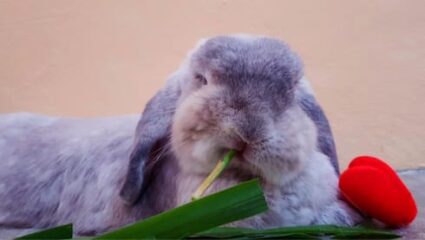
I have different types of pine trees in my yard. They all drop pine cones, but some look different than the “traditional” pinecones. Are these also safe for my bunnies?
I’ve tried the bitter apple spay but they seem to love the taste and are drawn to it… Do you have any more ideas or know of a specific brand of spray that works better???
I tried that same spray a few years ago, but watered-down vinegar is the best. It eliminates odors and is a safe cleaner as well. If you’re having a problem with them chewing corners of baseboards I learned that people make plastic protectors for that. If you’re using the bitter apple spray to get your buns to avoid an area try putting toys in that spot or cover it up completely with fleece or an alternative. Eventually, they will give up. It’s important to never stop training once you learn what to do. If your rabbit is being destructive give them a chew toy instead. This redirection is training their brain. Just like people do with human babies.
My rabbit is about 8-12 weeks old and she’s still very small recently she started to gnaw her teeth down on her plastic food bowl , I went out and bought her more toys so she had a larger variety of toys to gnaw on and also cute her Boredom I also took out the plastic bowl she was gnawing on, she’s taken no interest into any of her toys and has now started to gnaw on the other plastic food bowl however this one is attached to the top of her little hut in the cage and cannot be removed unless I remove the hutch obviously I don’t want to do that because she loves sleeping in there but I’m worried if she continues to gnaw on the plastic bowl it could harm her.